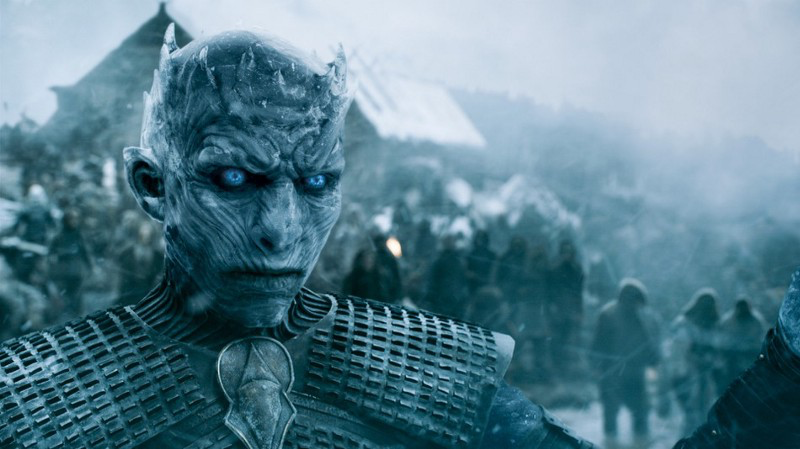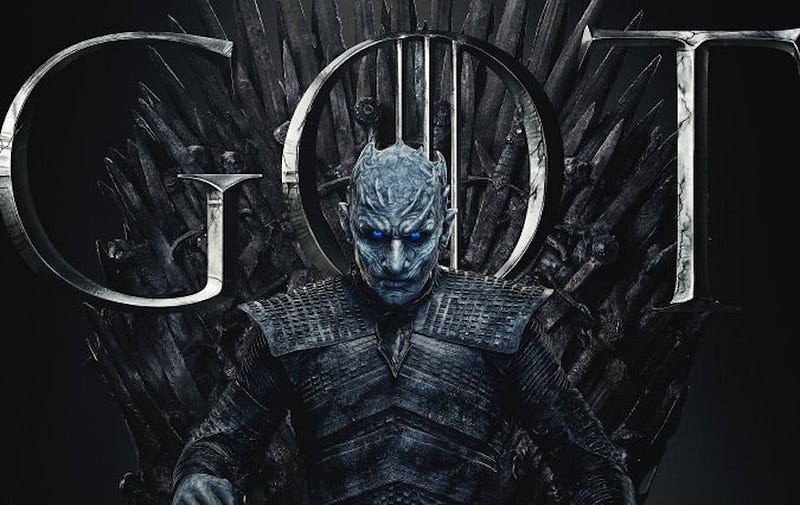The nigh-legendary fan outrage was caused by the most brutal anti-catharsis in the history of popular culture.
Few things hurt as painfully as mental anguish. People who loathe the final season of Game of Thrones aren’t some entitled cynics who only waited for the showrunners to stumble. They’re consumers of art who trusted the artists and projected an ecruciating real-world tension on a TV show. After 8 years of waiting for a purifying catharsis they watched the gravity of the real issue at heart of the show tear the fiction apart before their eyes. What hurts the most isn’t that the ending was good, bad, fair, this or that. It’s the fact that it reminded us of our own helplessness.
It made the tension return with a vengeance. Until HBO swapped GoT out for Chernobyl at least.
A mental burden
Catharsis is at the heart of all art. The purification of emotions first described by Aristotle in Poetics gives it meaning and utility. The mental minute of silence after a riveting scene or episode that reconciles us with conflicting or difficult feelings. The moment all voices in our heads stop talking and just gasp in awe as the sensation sets in: this is what peace of mind looks like.
We subconsciously seek art that will relieve the tensions that are screaming for attention from the back of our minds. In projecting our own conflicted thoughts, feelings, urges and wishes onto a carefully crafted narrative, we entrust them to the writers. When projection happens we don’t yet know if the narrative will resolve these conflicts in a way that our minds will accept — the only way for art to work is if we trust the artists.
One of the most stressful concepts in our minds is the awareness of climate change. When The Guardian is officially rebranding climate change as climate emergency and Bill Nye himself is tired of treating his audience like children who don’t know any better, in the face of potential doom even getting out of bed in the morning is becoming increasingly difficult.
Repressing fears associated with the crisis takes heavy-duty mental work.
Now, what has made it easier for us over the recent years to face this dread? What story, what collective dream captivated global audiences because it promised to help us purify it and integrate it in our conscious minds? A narrative that doesn’t shy away from hard truths, doesn’t pull any punches, and so obviously features a symbolic representation of impending disaster in its central theme?
There’s two of them, but for now let’s focus on Game of Thrones.

Disaster politics
Let’s use the real-world environmental crisis as a key to unpack the central theme of GoT.
There is something scary and deadly north of the Wall — that information is served at the very beginning of both the show and books. The people of the North are the only ones taking the threat seriously and for the most part also the only ones that we could call noble. Unfortunately, against their better judgement, they get entangled in a political intrigue between an unapologetically chauvinistic king and the richest family in all of western civilization… umm, Westeros, I mean.
As the story progresses, ecologists from the North are split between warning everyone of the impending doom and fighting their own battles for honor or survival, the ruling establishment (that only enjoys hunting and drinking more than war) gets assassinated by the prime lobbyist of the Big Money and in the general political clusterfuck everyone’s too busy to notice their civilization is on the brink of destruction. We then learn that the imminent disaster is caused by their ancestors’ colonial treatment of both the native Westerosians and the ecosystem. When you read into it, you could even say that a representative of The Old Ways who promises to bring the auto industry back to Westeros while riding her Shelby Drogon was never going to improve the situation.
While there were many great moments of storytelling along the years, the ecological theme is the most evident, encompasses most elements of the narrative, and enables us to make sense of lessons such as “don’t use fuel-based technologies to fight global warming cause they can turn into an undead dragon” or “hey let’s have a druid hippie king so that we’re always prepared for an ecological disaster.”
For years we’ve been either figuratively or literally screaming at the screen “stop fighting and save your world” in a reflection of the helplessness we feel when we look at ours. Finally the time has come for artists to relieve us of this pressure, to design catharsis that would purify our fear. We would then be able to see the Westeros around us, face its doom head on and say: not today, not this century!
So, what happened?

The ultimate narrative sin
Moments like this, when a change of heart of so many people is that sudden and spectacular, I’m always wary of reasons for it that are said out loud. Art engages us on a subconscious level, one that the general public doesn’t need to understand for it to cause strong emotions. For a lot of people, that’s where rationalization kicks in: the conscious mind is searching for logical reasons to justify and legitimize emotional responses, even though they were caused by something grating on a deeper layer. It’s a powerful process that can conflate events, bend time, and colour memories with different feelings after the fact.
Battle of Winterfell was the first time I noticed people using fiction facts to protest the quality of the show’s storytelling. “Fiction facts” don’t really exist and never keep us from engaging with a great story. There’s a lot of plot holes in the original Star Wars trilogy that are obvious if you look hard enough, but we never do because it’s more satisfying, pleasant and fun for our minds to enjoy that fairytale than it is to tear it apart. On the other hand, there are detailed breakdowns of the show’s long-awaited encounter as if it was supposed to feature actual military strategies. Fans even tried to reenact it in the fantasy strategy game Warhammer 2: Total War to show how silly it all was. Looking at real-world logic in search of reasons for a sudden change of heart is no less silly, but it tells us something vital: this is when it became more enjoyable for our minds to tear Game of Thrones apart than to stay immersed in the fiction.
If we keep in mind the central theme of the show and the weight of the real-world tension, with which it promised to help us cope, it should be all but obvious what really went horribly wrong in that episode. In having Arya Stark destroy Night King along with the entire disaster he symbolized with a single stab, it trivialized a complex and horrifying threat. Resolved it in a way that we know deep down is wrong, because for our sins against nature — ours and our ancestor’s — there will be a price to pay to just hold it back. It won’t just vanish if we train Al Gore in the assassin ways.
In that episode, the least of Game of Thrones’ mistakes is that it tried to tell us that nothing that we care about needs to be lost through only B-list characters dying in a convoluted battle of absurd tactics. It also cheapened the reason for the nigh unbearable stress caused by our increasing awareness of the incoming climate disaster by making its fictitious counterpart just vanish when pierced with a dagger. The show thus shirked from relieving the tension it carried for eight years. It held it to keep the fans engaged, but then passed it back to us like a hot potato after failing to prepare us for the burden.
Essentially, it provided an anti-catharsis, a narrative cardinal sin if there ever was any.

An alternate ending
This one blunder upset the entire show, toppling other storylines over like dominoes. The greatest grievance raised against the showrunners is Daenerys’ sudden murderous urge that she gave into in the penultimate episode. It’s not that the ending to Dany's arc wasn’t foreshadowed by her cruel ways of the past, going as far back as the very first season. It’s just that it felt forced and no longer made sense.
It's usually an external conflict in a story that forces characters to face an internal one first. With the external threat of the White Walkers gone, the people of Westeros lacked a strong and relatable cause to bring upon the ultimate demise of the Targaryens. Thus the writers had to push Daenerys into an absurd situation to compensate for the part of the narrative they bungled.
Because of what that character did during the previous seasons, Dany had to die for the story to reach a catharsis. By removing the external force that could erase the whole of Westeros the moment it went out of whack the showrunners wrote themselves into a corner and concocted a terribly forced scheme to get out of it.
A writer puts a story into words, but practically everyone can feel it. That’s what makes art work — artists make tangible what we recognize as an embodiment of something intangible within us. Dany’s abrupt psychotic break was doubly grating because again it made us instinctively feel what the narrative should’ve actually looked like.
Imagine another ending, in which the White Walkers were halted, at a huge cost to the defending forces at Winterfell, but allowed to retreat. The Night King, as the personification of this threat, had to die to complete this narrative arc, but it didn’t mean the end of all Walkers. [In fact in the books it’s likely the Night King was never supposed to be the first original Wight that he was on TV.]
In this version, Dany hears the bells and accepts the surrender. As the victor, she decides to burn Cersei for her crimes, to which Jaime (who functions as basically a braver Tyrion at this point) protests and is either executed along with his sister or casts himself in the flame’s way. As Tyrion watches those events, horrified, he recalls what happened to the Tarlys. He’s warned Daenerys then and there that she needs to change her ways if she ever hopes to rule these people. With the Walker threat looming and wounds they dealt still fresh, we understand that Westeros can’t afford to be ruled by a queen who has more enemies than allies, one that would further divide the kingdom instead of uniting it. Jon Snow is the executor of her sentence as her polar opposite, the Targaryen willing to cast aside his legacy and take responsibility for his ancestors’ sins by ending his bloodline and rebuilding the Wall. Bran the druid and keeper of the memory of humankind is the logical choice to become king if the new Westeros is to never repeat mistakes of its past again.
Practically every event of the show’s finale works and makes sense IF there is still an external threat looming over the realm.
In all of this, Daenerys wouldn’t need to have that cartoonishly villainous turn in The Bells. Instead, she would be the last in the long line of Game of Thrones’characters to suffer long-term consequences of her own choices. Choices that she made ignoring warnings of people who held her dear, a long time ago, that she fails to see as misguided until the very end.
It would be just like every other character arc that made this show great in the first place.
But no, they just had to stab global warming.

---
Comments
Post a Comment
Thanks!